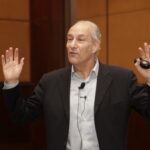I have never understood why we focus on individual leaders learning leadership skills in isolation from their peers without the context of their work.
It seems obvious to me that we lead in context. What sounds impressive extracted from any context often won’t work in a specific place at a specific time. I cannot think of many leadership capabilities that do not require context to be applied successfully.
And why struggle on your own when your peers understand your challenges better than anyone else? We’ve known about this for a very long time.
There is a straightforward solution with a ton of evidence to support it: let leaders work on their own problems, develop contextual solutions, and agree on leadership standards across the organisation.
Why am I so sure it will work? Let me share some evidence from the last 70 years.
The evidence: 1950s
You can trace empowered group working back to the ideas of postwar psychologist Kurt Lewin. After he came to the United States post-Second World War, he established, in the 1950s, a ‘lab’ at MIT. There, he developed the concept of “T Groups”. Sanjay Gupta, in a recent LinkedIn article, described the underlying principles as:
“self-awareness, feedback, and open communication—[which] are timeless. In an increasingly prevalent era of remote work and digital communication, authentic, face-to-face interaction is more critical than ever. T-groups offer a powerful antidote to the isolation and miscommunication that can arise in virtual environments.” Kurt Lewin and the birth of T Groups: An Approach to Self-development.
The whole group then hold the individual to account
Then, in the 1970s, Lev Vygotsky, the Russian psychologist, developed his theory of peer learning. He talks about “zones of proximal development”. By observing children’s learning, Vygotsky realised that a sweet spot existed where people with similar experience, knowledge and ability learned very effectively together.
They learned faster than being forced to learn on their own. But the ZPD is bordered by the fear zone. Fear occurs when a person is put in a group far more knowledgeable and experienced than they are.
The individual feels isolated and paralysed and finds it almost impossible to contribute. There is also a boredom zone where the level of knowledge and experience on display is far below that of the individual. So they get quickly bored and can’t be bothered to contribute!
1970s
Again, in the 1970s, Reg Revans, an organisational development consultant at the National Coal Board in the UK, developed the idea of action learning. He described the process as a group of “colleagues in adversity” working together to solve the challenges they faced and then committing each other to taking the appropriate action they had agreed, to rectify the situation.
Revans believed “there can be no learning without action, and no action without learning.” He brought those two ideas together in the process where a group of peers shared a challenge.
The members of the group each, in turn, ask the problem owner as many probing, open questions as needed to get to the point where that problem owner has gathered enough insights to work out a course of action.
The whole group then hold the individual to account by committing that person to implementing those agreed actions.
Critchley: 2022
Much close to home, Hannah Critchley, the Cambridge Neuroscientist, explored the concept of collective intelligence in her most recent book “Joined-Up Thinking” (Hodder 2022). She wrote:
“Collective intelligence is precisely the approach we need to overcome our individual brain’s limitations and hit new heights. Pooling ideas and gathering different perspectives allows us to tap into the wisdom and experience embodied in a group of people.”
It also creates a broader understanding of an organisation’s systemic challenges
Revans said something similar in the context of leadership:
“The ultimate power of a successful [leadership team] lies, not in the brilliance of its individual members, but in the cross-fertilisation of its collective abilities.”
Critchley clearly builds on 50 years of research by psychologists and neuroscientists into how humans interact and learn. The early work was observational. The more recent research is to observe the brain in action. Critchley noted that observations of the brain show that:
“electrical oscillations between people’s brains synchronise when they’re engaged in a communal activity so that people are more likely to literally see the world in the same way.”
This is collective intelligence at work.
A higher level of understanding
By working together to reflect on issues and problems, each individual is made aware of the strength of his or her own contribution. A higher level of understanding emerges because of the richness of the ensuing dialogue and the collective resolution that emerges from the group.
I am sharing this to indicate that a vast body of evidence suggests that bringing self-organising groups together to solve their challenges and agree on action is one of the most effective ways of developing people. It is the best way for leaders to share their wicked problems and develop the best possible solutions.
However, a second benefit emerges: teams who work closely together develop a collective response and align their views, actions and behaviours.
As a result, leadership becomes more integrated and consistent. It also creates a broader understanding of an organisation’s systemic challenges and helps develop strong trust across the leadership cohort, which is a massive strength when times get tough.
Please give this a try, as it is incredibly cost-effective and a powerful agent of a positive workplace culture.





